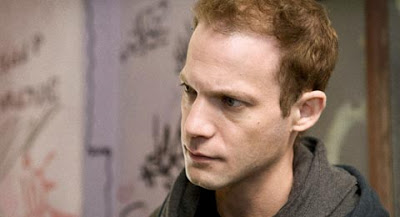Free at last, Israeli actor Itay Tiran endorses BDS and says Zionism is racism
 |
| Jonathan Ofir on September 8, 2018 |
I was really taken by Itay Tiran’s acting in the gripping British mini-saeries ‘The Promise’ directed by Peter Kosminsky. The series is about Israel-Palestine, jumping back and forth between pre-state years and current events.
Tiran was playing a Jewish-Israeli leftist who joined Combatants for Peace, and his sister considers him an anti-Zionist. He seemed really authentic in that role, challenging his ‘liberal-Zionist’ parents and pointing out their hypocrisy.
Now, the 38-year-old actor is leaving Israel for Germany, and he gave an interview to Haaretz, where he is really uncuffed. He speaks in favor of BDS, rationally. He calls Zionism racism – not as hyperbole – he’s just rational and logical about it.
Really, it is so liberating to read. These are expressions that Zionists are trying to ban all over the world – and he’s just free as a bird speaking about it! I imagine that he has saved this for his emigration move, because the backlash you can get in Israel for this can be a serious mess.
In the interview excerpts released so far by Haaretz (they plan to publish the full interview in Haaretz’s Hebrew cultural supplement), Tiran says that BDS is perfectly legitimate:
BDS is a perfectly legitimate form of resistance. And if we want to preach for a certain kind of political discussion that isn’t violent, we must strengthen these voices, even if it’s difficult. I think a normal political left should support BDS. After all, it doesn’t matter what the Palestinian will do. When he commits an act of terror he is called a violent, bloodthirsty terrorist. And when he supports BDS he’s a political terrorist. If what finally leads to a solution here will be non-violent pressure, conducted as political discourse, then why not support it? It’s a humanist approach, and it’s also practical, and I think it will prevent the next wars.
That’s certainly not a view shared by Israel, which has whole ministries and huge budgets dedicated to the fight against BDS. Tiran cuts right through.
He talks about Israel’s fascism, and the denial of it:
You get up in the morning, drink your coffee and read the paper. You look at a story and say, So is this the moment in which we’ve become fascist or isn’t it? You sit with yourself and play a kind of game, and gradually you realize that all you do is keep asking that question and playing that game, without deciding.
He talks about how the recently passed basic law declaring Israel the nation state of the Jewish people isn’t really all new, and that in that sense it isn’t really all bad, if it serves as a wake-up call:
If the nation-state law is a reference point, from which you calculate where Israeli society is, then clearly it’s a racist, non-egalitarian law, another step in the nationalist shift taking place here. On the other hand, I say it’s not only bad. Why? Because it forces out a kind of collective subconscious that has always existed here. The Declaration of Independence and talk about equality and values, all those were the self-preening of a colonialist boasting of enlightened liberalism. There are people who still call themselves center-left, and still think that if they put the word equality into the law everything will be all right. I don’t think so. And really, the right’s justified counter argument was, hang-on, but there’s the Law of Return. Why is it that only the nation-state law drives you crazy?”
Great points. So interviewer Ravit Hecht then asks him the big question:
“So you’re saying Zionism equals racism, no matter what?”
“Yes”, Tiran answers.
So simple. Israel’s former Ambassador to the UN Chaim Herzog went ballistic on that issue, and famously tore up the 1975 resolution that equated Zionism with racism. The US ambassador to the UN, Daniel Patrick Moynihan, gave a famous speech denouncing the resolution as the work of Nazis.
[T]he Abomination of anti-semitism has been given the appearance of international sanction. The General Assembly today grants symbolic amnesty — and more — to the murderers of the six million European Jews.
And here is Tiran, accepting the equation, rationally, peacefully and unequivocally.
Naturally, the discussion goes further:
“That Zionism equals colonialism?”, Hecht asks.
“Yes, exactly. So we all have to look at the truth, and then take a side.”
It doesn’t get any clearer than that. It isn’t complicated. The full interview will certainly be something to look forward to. As I said, a liberation.


